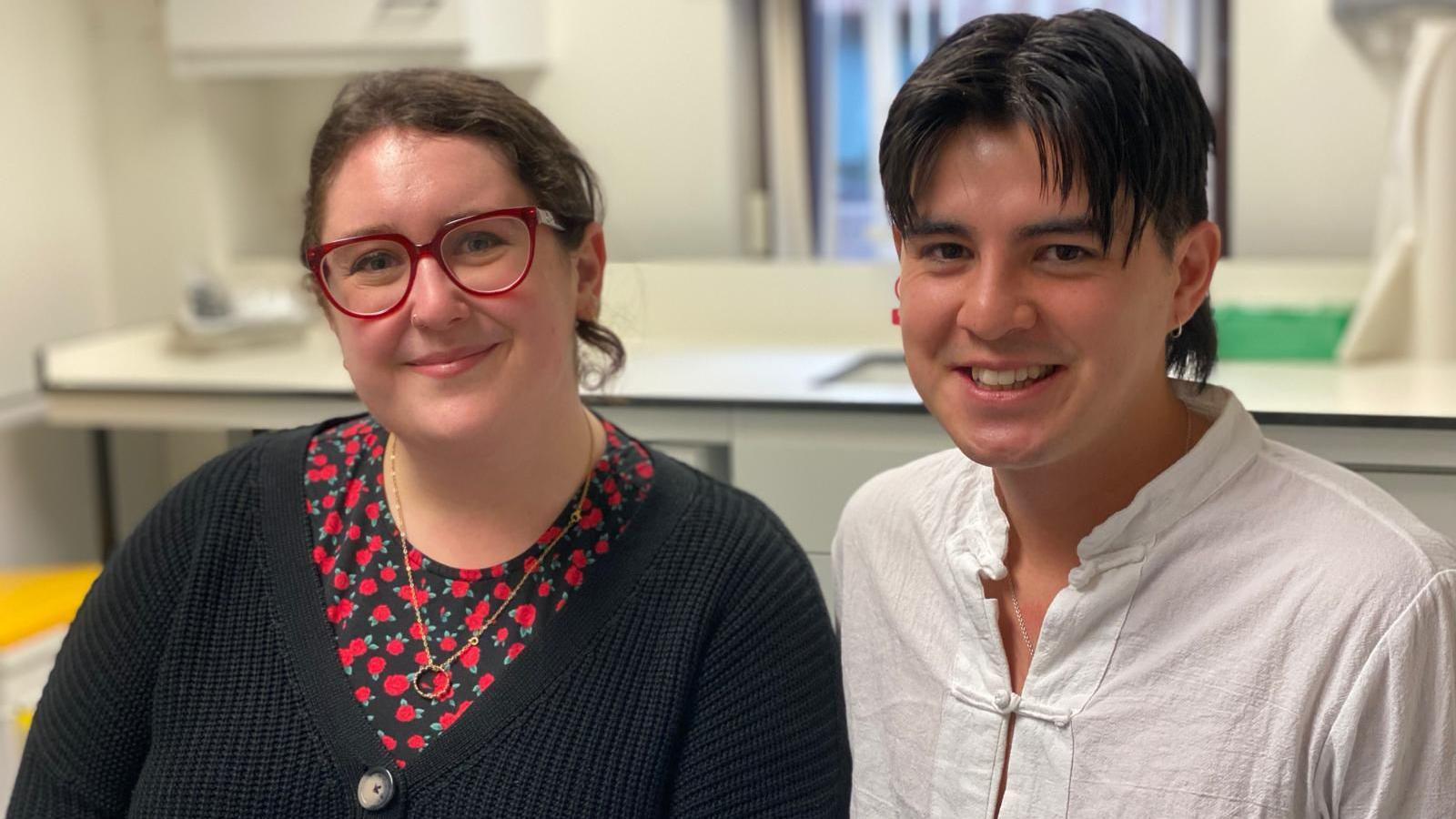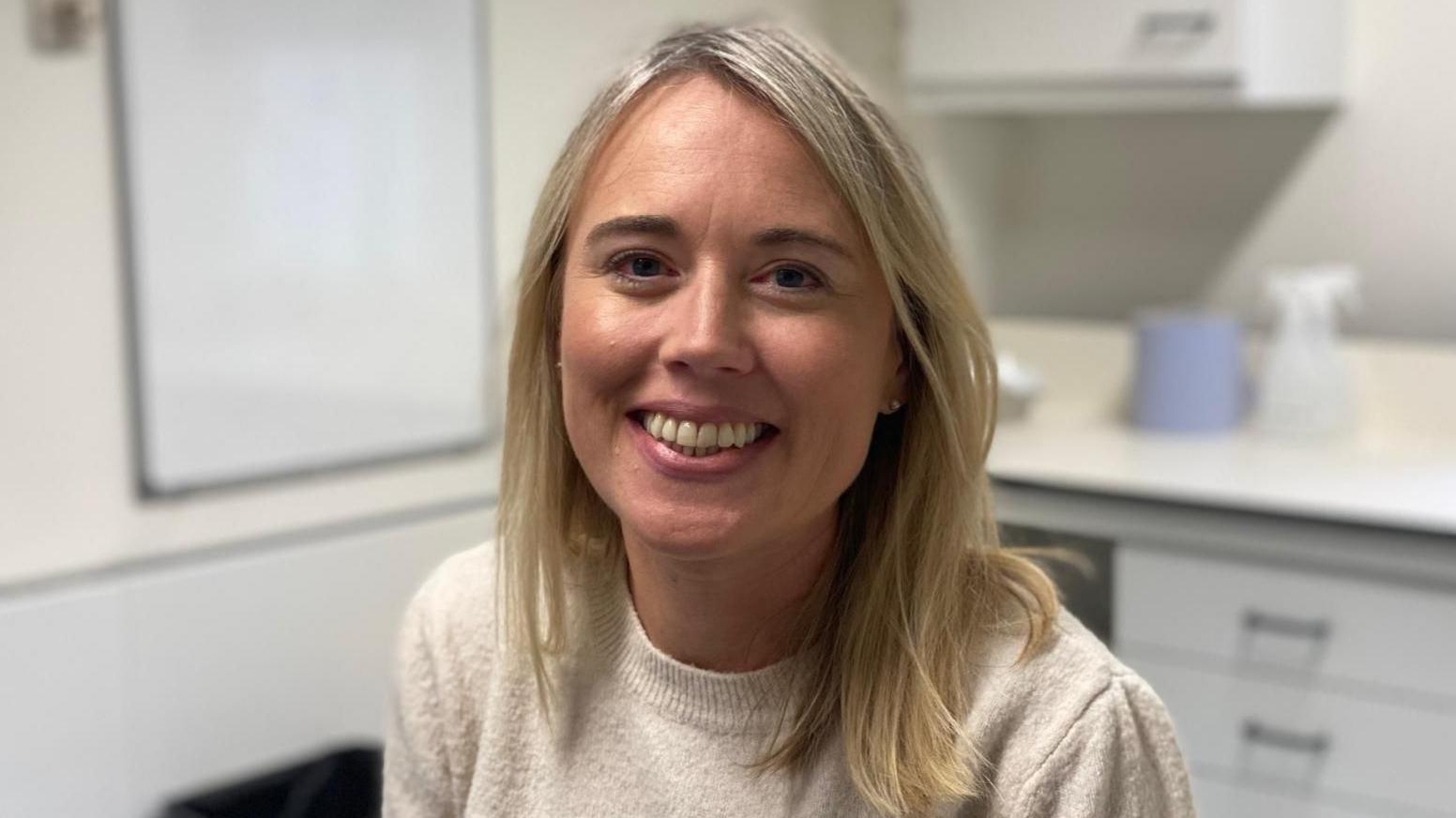New antidepressant study focuses on young people

Alex and Katie are working on a study hoping to improve understanding of antidepressants and their effect on young people
- Published
Alex and Katie have both dealt with depression.
Alex, 24, describes it as "very visceral… a kind of buzzing in my head that meant I was unable to do a lot of things or just concentrate on normal, average things every day".
Katie, 23, agrees.
"You wake up and feel like you've got to drag yourself through the day," she says.
"It just sucks the joy out of life."
Antidepressants - drugs that increase levels of chemicals in the brain linked to mood and emotion - are one thing that have helped both to better manage the condition.
While millions of young people take them and report a positive benefit, for others they are less successful.
Alex and Katie are working on a new study that's hoping to shed light on why.
Research from the Office for National Statistics in 2022 suggested 16 to 29 year olds were the age group most likely to experience some form of depression in the UK, with 28% reporting symptoms.
Latest NHS statistics, external say 1,846,533 people aged 15-29 were prescribed antidepressants in 2023, compared with 1,404,138 in 2016.
The new Oxford University study is looking at how one widely used SSRI, Fluoxetine, also known as Prozac, affects young people.
Katie, who is helping to develop the study alongside Alex, says antidepressants are not a "magic bullet" but helped her a lot.
She says they reduced the "constant negativity in [her] brain" while Alex says they helped to neutralise his mood swings and feeling like he had to "firefight every day".
But deciding whether to begin taking them wasn't an easy decision for Katie.
"I think there's a narrative that antidepressants are sort of a last-resort treatment and I very much had that perspective to start with," she says.
"But that can be really harmful… because you have people getting to rock bottom before they feel like it's okay to try antidepressants."
Alex believes it's become a lot more socially acceptable among younger people to talk about depression and medication.
"But on a clinical level there's a real lag in understanding about how we use antidepressants and what they do," he says.
"The work that we're doing is trying to address that gap."

Prof Catherine Harmer is leading the study
Prof Catherine Harmer, who is leading the study, says antidepressants are viewed differently to other medical treatments.
"You could take hormonal treatment for period pain or migraine treatment and I don't think that you would receive the same level of judgement and criticism as you do around antidepressants," she says.
Prof Harmer believes more understanding of how antidepressants specifically affect younger people will help to address concerns.
"This is really critical because we can't assume that the effects in adolescents are exactly the same as you see in adults," she says.
It's hoped the study results will allow clinicians to predict who the drugs are most likely to work for - and prescribe better.
"Adolescence is a really important time of development where lots of things are changing and where mental health problems such as depression can often occur for the first time," says Prof Harmer.
"So it's really important to understand and treat adolescent depression properly."
Prof Miranda Wolpert, from the Wellcome Trust, the charitable organisation funding the study, says SSRIs are a "vital part of managing depression" for many young people.
"Yet despite their widespread use, we still know far too little about how they work - and importantly why they sometimes don't - in adolescents."
About 80 people are taking part in the study, which is expected to conclude in a year.
Katie and Alex's work has involved modernising research methods used in previous studies.
Alex says they've helped make them more user-friendly and relevant.
"A lot of the testing came from between the 1970s and 1990s and it's just really outdated, the wording is really poor and it's in formats that look like something from the 70s," he says.
Katie hopes the research will mean more people her age can get help in the future.
"No-one asks to have depression," she says.
"If I can use this situation that's been really difficult and really painful and get something good out of it, at least other people can get some help from what I've gone through."
Sources of advice
Experts previously told BBC Newsbeat that antidepressants aren't for everyone, and other forms of therapy and self-care can include:
Physical exercise
Spending time outside
Making sure you have adequate vitamin D levels
Proper sleep
Making meaningful social connections.
As well as speaking to your GP to work out a treatment plan tailored to you, they also advised other sources of advice.
IAPT / Talking therapies, external
Royal College of Psychiatrists, external
Additional advice can be found at mental health charities such as Mind, external and Young Minds, external.
For details of more organisations offering help and support, go to BBC Action Line.
